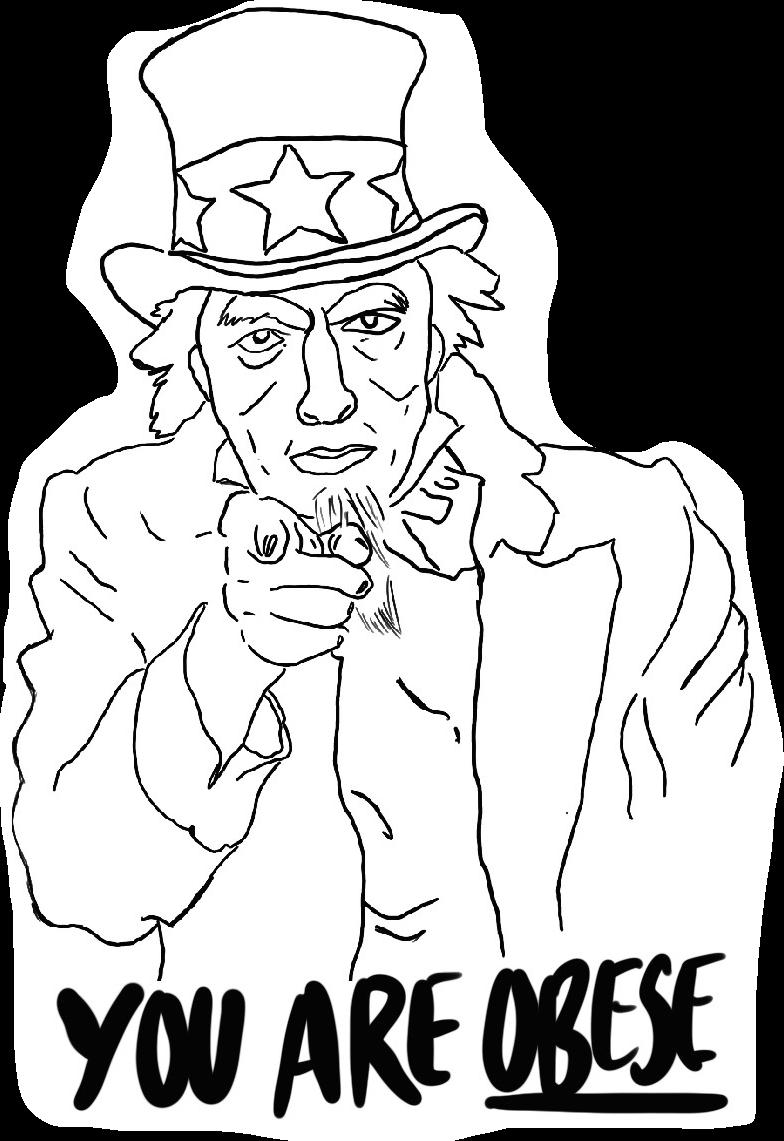
3 minute read
“Obesity”, the Big Fat Lie of Medical Fatphobia
from Summer 2022
by Pablo Ruiz Delgado
TW: fat shaming and eating disorders
Advertisement
I was barely ten when I came out of the doc-down. Every month, my mom would take me to an hour-long doctor appointment for a checkup. Every month, he’d spend a solid third of the session calling me ‘obese’, ‘overweight’, and comparing me to animals like seals and walruses (because they’re fat). Every month, he’d tell me to strip naked and get on the scale, then argue with my mom for several minutes about her ‘overfeeding’ me.
It seems this one time he got fed up of arguing and decided to prove the point. So he turned to me and said: “Boy, look down. Can you see your penis?” I couldn’t, of course, because my fat, overfed, walrus-like belly was in the way. Most of us know that fat people are laughed at and bullied in school, at the workplace, on the streets, and most would agree that it’s repugnant. And yet, most people are unaware of the much more dangerous, systematic fatphobia perpetrated by medical institutions and professionals, disguised as them trying to ‘help’ us.
The most blatant form of medical discrimination against fat people, and yet the most widely normalized, is the term “obesity”. The meaning that many think it to be a more sciis, it’s complete and utter bullshit. Firstly, had been increasing talk of an ‘obesity epidemic’ threatening public health worldwide. As fat activists and scholars have pointed out, this so-called epidemic was nothing but a manufactured moral panic.
Grotesque exaggerations of the rise in obesity and its health risks were propagated almost entirely by conservatives in the US and UK who thought that the emasculated, and corrupted by men growing fat. Fat women were of course also seen as degenerates, since child rearing required their bodies to be in an ‘ideal’ state, which fatness naturally is not. It was in this climate that medical institutions decided to make obesity a disease and embraced the ‘obesity epidemic’ discourse that persists to this day – not to ‘help’ fat people, but to legitimize discrimination against them
Even more striking is the way that obesity clear symptoms to identify it, so instead it’s century by non-medical statisticians to simply measure the ratio of a person’s height to their weight, which means it doesn’t take into account muscle mass, bone density, or stature, among other things. Despite its cartoonish uselessness, the WHO still arbithan 30” and publishes annual obesity reports using this measure. It’s a completelyease that isn’t a disease. “Obese” is not a sciepidemic, fatphobia is. is."
If the reader is still in disbelief that respectable medical institutions would adhere to such obvious bullshit, allow me to merelyentists accepted that Blacks were genetically less intelligent than Whites, and how until the end of the 20th century, homosexuality was extensively considered a mental disorder by the medical community. If they were racist and homophobic then, they can be (and are) fatphobic today. it comes to other instances of pathologization, the pathologized are more often seen as victims of their condition. For example, those addicted to hard drugs, though they face much prejudice, are seen by most as victims of their addiction. Fat people, however, are blamed for being what they are: losing weight is entirely their responsibility, staying fat is entirely their fault. Not only does this mindset frame fatness as a negative thing by default, but it also dismisses all social, economic and psychological factors that lead to fatness.
"Obesity" conceals and fuels one of the most insidious kinds of fatphobia. When anyone looks at a fat person, they don’t see someone worthy of respect and self-determination, they see a manifestation of obesity. Instead of a human being, they see a clumsy, gross mass of ‘poor’ eating and exercise habits that ought to escape their miserable condition weight-loss pills. This phenomenon called “pathologization”, reducing an individual down to the traits and stereotypes of a perceived disease, has been widely researched in relation to fatphobia.
The explosion of fast-food franchises and convenient delivery apps, coupled with increasing work hours and work-related anxiety, have resulted in increased consumption of the kind of food that leads to gaining weight. Another factor for increased fatness brought to you by late-stage capitalism is a rise in mental illness, which in turn provokes food addiction in many people who try to compensate for some other void in their life. Or what if – and this is the main point – someone just wants to be fat? They enjoy eating, they don’t enjoy doing sports, they don’t mind being fat. Why the fuck should anyone else judge these choices or instruct them on how they should act? Fat people are worthy of respect and dignity no matter how fat they are, how much they eat, or how little they move. And please, for the love of sweet Jesus Christ, stop calling fat people ‘obese’ or ‘overweight’. It’s not a euphemism, it’s not more polite, and it’s not more technically correct.

